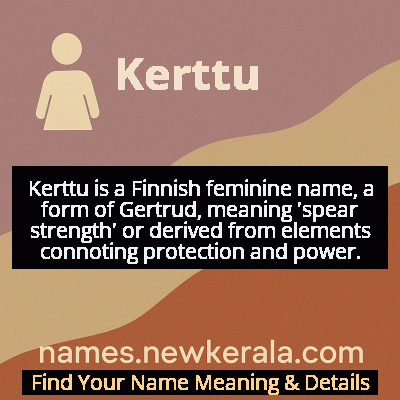Kerttu Name Meaning & Details
Origin, Popularity, Numerology Analysis & Name Meaning of Kerttu
Discover the origin, meaning, and cultural significance of the name KERTTU. Delve into its historical roots and explore the lasting impact it has had on communities and traditions.
Name
Kerttu
Gender
Female
Origin
Finnish
Lucky Number
5
Meaning of the Name - Kerttu
Kerttu is a Finnish feminine name, a form of Gertrud, meaning 'spear strength' or derived from elements connoting protection and power.
Kerttu - Complete Numerology Analysis
Your Numerology Number
Based on Pythagorean Numerology System
Ruling Planet
Mercury
Positive Nature
Adventurous, dynamic, curious, and social.
Negative Traits
Restless, impatient, inconsistent, prone to indulgence.
Lucky Colours
Green, white.
Lucky Days
Wednesday.
Lucky Stones
Emerald.
Harmony Numbers
1, 3, 9.
Best Suited Professions
Sales, marketing, travel, entertainment.
What People Like About You
Versatility, charisma, adventurous spirit.
Famous People Named Kerttu
Kerttu Krohn
Actress
Prominent Finnish theater and film actress known for her roles in classic Finnish cinema
Kerttu Huttunen
Politician
Finnish politician and member of parliament known for her work in social affairs
Kerttu Niskanen
Cross-country skier
Olympic medalist and World Champion cross-country skier representing Finland
Kerttu Rissanen
Textile artist
Influential Finnish textile designer known for traditional ryijy rug designs
Name Variations & International Equivalents
Click on blue names to explore their detailed meanings. Gray names with will be available soon.
Cultural & Historical Significance
During the 19th century national romantic period, names like Kerttu experienced a revival as Finns sought to strengthen their cultural identity separate from Swedish and Russian influences. The name represents a bridge between ancient Finnish traditions and modern national consciousness, embodying the resilience and strength that characterize Finnish cultural identity. In rural Finland, Kerttu was often associated with capable, hardworking women who maintained household traditions and cultural practices.
The name's persistence through generations demonstrates its enduring cultural relevance, serving as a living connection to Finland's linguistic and mythological heritage. Even as naming trends have evolved, Kerttu remains a choice that consciously honors Finnish tradition and cultural continuity.
Extended Personality Analysis
Women named Kerttu are often perceived as strong-willed, independent, and resilient individuals who embody the 'spear strength' meaning of their name. They typically demonstrate practical intelligence, determination, and a no-nonsense approach to life's challenges. These individuals often possess a quiet confidence and inner strength that allows them to persevere through difficulties while maintaining their integrity.
Kerttus are frequently described as reliable, grounded people with deep loyalty to family and community. They tend to be thoughtful decision-makers who approach problems methodically, combining traditional wisdom with practical solutions. Their strength often manifests as emotional resilience and the ability to provide stable support for others during turbulent times.
In social settings, Kerttus are often seen as the steady, dependable presence in their circles – not necessarily the center of attention, but valued for their wisdom and reliability. They typically exhibit a strong work ethic and take responsibilities seriously, whether in professional contexts or family life. The combination of traditional values and inner fortitude makes Kerttus particularly adept at navigating complex situations with grace and determination.
Modern Usage & Popularity
In contemporary Finland, Kerttu maintains a presence as a traditional choice that appeals to parents seeking names with cultural heritage. While not among the most popular names in recent decades, it has experienced occasional revivals, particularly among families with strong connections to Finnish traditions. According to Finnish Population Register Centre statistics, Kerttu appears most frequently among older generations but continues to be given to newborns each year. The name's usage reflects a broader trend in Finland where traditional names cycle in and out of fashion, with Kerttu representing a choice that honors family heritage and national identity. Its relatively rare usage in modern times makes it distinctive while maintaining cultural authenticity. Interestingly, the name has seen slight increases in usage during periods of national celebration or cultural rediscovery, demonstrating its continued relevance as a symbol of Finnish identity.
Symbolic & Spiritual Meanings
The name Kerttu carries rich symbolic meaning derived from its etymology and cultural associations. Primarily, it symbolizes strength and protection through its original meaning of 'spear strength,' representing both defensive capability and the courage to face challenges directly. The spear imagery suggests precision, direction, and the ability to cut through obstacles. In Finnish context, Kerttu also symbolizes connection to nature and traditional wisdom, evoking images of strong Finnish women who have maintained cultural traditions through generations. The name embodies the concept of 'sisu' – that uniquely Finnish quality of determination and resilience in the face of adversity. Additionally, it represents authenticity and rootedness in cultural identity, serving as a symbolic link to Finland's mythological past and national heritage. The name's enduring presence across centuries symbolizes cultural continuity and the preservation of linguistic traditions in the face of modernization and global influences.

